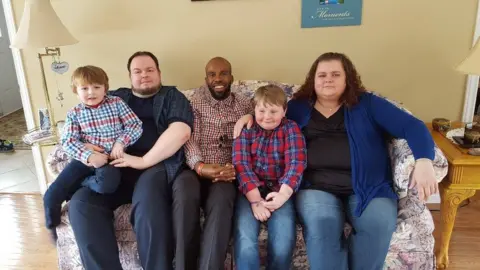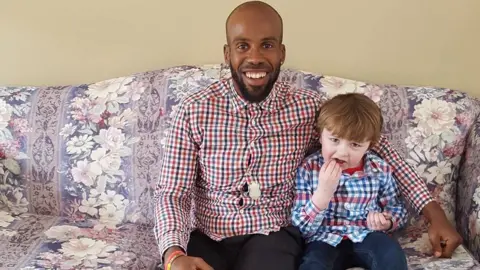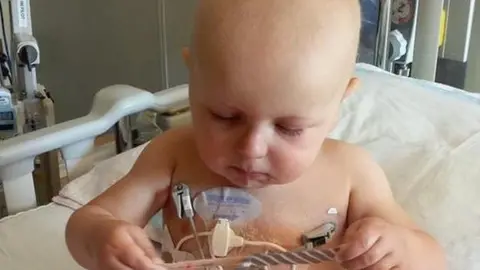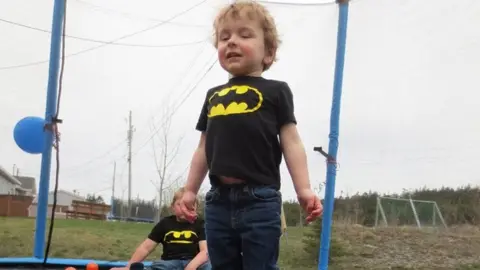Unlikely bone marrow match that led to a close connection
 Melissa Slade
Melissa SladeStatistically speaking, they were an unlikely pair. But after Michael Menafee donated his marrow to baby Jaxson Slade, the two became bonded by more than blood and bone.
When Menafee landed at the St John's airport on the Canadian island of Newfoundland in April, he didn't know what to expect. The 32-year-old Chicago native had travelled almost 4,000km (2,485 miles) to spend Easter with a family he had never met.
But while he was greeted at the airport by strangers, he quickly realised he was already part of the Slade family.
"It was like we knew each other for years... that's how comfortable I felt," he told the BBC from his home in Guatemala, where he is working in the US Peace Corps.
Three years ago, Menafee donated some of his bone marrow to Jaxson Slade, who was diagnosed with acute myeloid leukaemia when he was just 13 months old.
Although the donation procedure can be painful, Menafee said it was "doable", and he was fully recovered in about two weeks.
He donated at Georgetown University Hospital in Washington, DC, and Jaxson was given the transplant at Sick Kids Hospital in Toronto. The two didn't even know each other's names.
 Melissa Slade
Melissa SladeIt wasn't until Jaxson's mother Melissa Slade asked the donor programme DKMS for his contact info in 2016 that Menafee even knew Jaxson had survived. According to donor rules, participants must wait two years before their identities are revealed, and only if the donor agrees.
Thanking the man who gave Jaxson life was as much a part of the healing process as the transplant itself, Slade says.
"I gave birth to him, but I really couldn't give him life. It was Michael who gave him the gift of life," she says. "How do you even begin to thank someone for that?"
When Jaxson was diagnosed in the autumn of 2013, doctors said the only thing that could cure him was a bone marrow transplant. But with no good matches in his family, Jaxson became one of the 50,000 people each year who look for a marrow donor from a list of strangers.
About half of the people on the donor list will never find a match, but luck was on Jaxson's side. Menafee had seen a sign for a donor drive run by DKMS at Indiana State University, where he was attending graduate school for public health.
Having lost his own mother to leukaemia in 2006, Menafee knew how important it was for people to volunteer. But most people who donate a sample to the registry never get called to actually donate bone marrow, DKMS says.
 Melissa Slade
Melissa SladeSo when Menafee learned there was a one-year-old boy in Canada who needed his bone marrow, he was excited. Their match was especially surprising to doctors because Menafee is African-American, while Jaxson is white.
Doctors match bone marrow according to proteins, called human leukocyte antigen (HLA). With many different HLA markers, it can be difficult to find someone who is a close match and people with different races will have an especially hard time.
"Patients have the highest likelihood of finding a match with a donor who may share their ethnic background," says DKMS director of medical logistics David Means.
It's one of the reasons why donor programmes are always looking for diverse volunteers.
Finding out Jaxson was alive and well was a huge relief, Menafee says. His own mother died from complications from a stem cell transplant, and he was nervous that his donation would not help Jaxson heal.
But in the end the two were a "perfect match", Means told the BBC.
"I was amazed and thankful to find out I was a 10/10 match, which is extremely rare especially from different races," Menafee says.
After communicating regularly through email, Slade and her grandparents invited Menafee to visit the family in Newfoundland for Easter.
Once there, the family had an open house to welcome him. He toured the picturesque seaside towns near St John's, saw icebergs and enjoyed a traditional Jiggs dinner, a Sunday boiled feast common in Atlantic Canada.
"He really felt like part of the family, it was an immediate connection," Slade says.
And Jaxson - who is now almost five years old - enjoyed meeting the man who saved his life, even if he didn't really understand how. Carrying a white teddy bear, Jaxson gave Menafee a big hug and a smile, especially when he saw that Menafee had brought him a Mario Brothers bag as a present.
 Melissa Slade
Melissa SladeHis cancer is in remission and there's only a very small chance that it will come back, Slade says.
"You'd never know it to look at him now, he's a big ball of energy that doesn't stop."
While Menafee and the Slades didn't know of each other's existence until last year, now they speak every week. When Menafee left Newfoundland after the holiday, he promised to return.
"This is not goodbye, it's see you later," he said.
